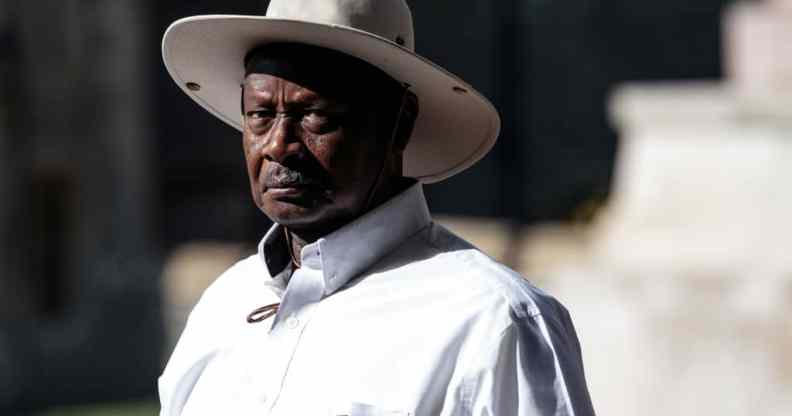Ugandan president Museveni wins sixth consecutive term after campaign marred by homophobia and violence

Yoweri Museveni, president of Uganda, branded LGBT+ people as “deviants”. (Jack Taylor/Getty)
The incumbent president of Uganda, Yoweri Museveni, has won his sixth consecutive term after an election campaign marred by aggressive homophobic rhetoric.
On Saturday (16 January) Museveni was once again declared the winner of the presidential election with 58.64 percent of the vote. He has ruled over Uganda since 1986.
His main opposition, the former pop star Bobi Wine, was dogged by rumours of homosexuality and funding from “homosexual groups” after Museveni painted him as “an agent of foreign interests” who promoted LGBT+ rights.
“He gets quite a lot of encouragement from foreigners and homosexuals,” Museveni was reported saying in an interview days before the election. “Homosexuals are very happy with Bobi Wine. I think they even send him support.”
Homosexuality became a hot-button issue in the east African country as Museveni continued ramping up the homophobic rhetoric, describing gay people as “deviants” and blaming the deadly political protests on groups funded by foreign LGBT+ rights organisations.
“Now, we have a problem of social imperialism from some parts of the world towards Africa,” the 76-year-old told CNN‘s Christine Amanpour.
“Homosexuals are not new to Africa. They have been here. We know them. But we have got a different view of them. We think they are deviants. They are people who are deviated from the normal.
“They are not killed, they are not harangued, they are not persecuted, but we don’t promote them… We don’t promote and flaunt homosexuality as if it is an alternative way of life.”
Contrary to Museveni’s claims, LGBT+ people are routinely killed, harangued and persecuted in Uganda, which is among the most homophobic countries in the world.
The hostile climate worsened as local politicians followed Museveni’s lead, repeating his anti-gay sentiment to stir up hatred and win votes by pledging to eradicate homosexuality in Uganda.
This scapegoating of the LGBT+ community led to advocacy groups reporting increased harassment, while many queer Ugandans said they were afraid to go out and vote.
Tensions grew so much that the UN was forced to issue a call for LGBT+ Ugandans to be treated with respect and dignity, fearing that increased vilification could worsen violence and reduce access to AIDS treatment.
“Using offensive language that describes LGBT+ people as ‘deviant’ is simply wrong,” said Winnie Byanyima, head of UNAIDS. “Stigma and discrimination based on sexual orientation violates rights and keeps people away from HIV testing, treatment, prevention and care services.”
Unfortunately with Museveni extending his 36-year hold over the country, the hope of progress looks poor for LGBT+ Ugandans.

